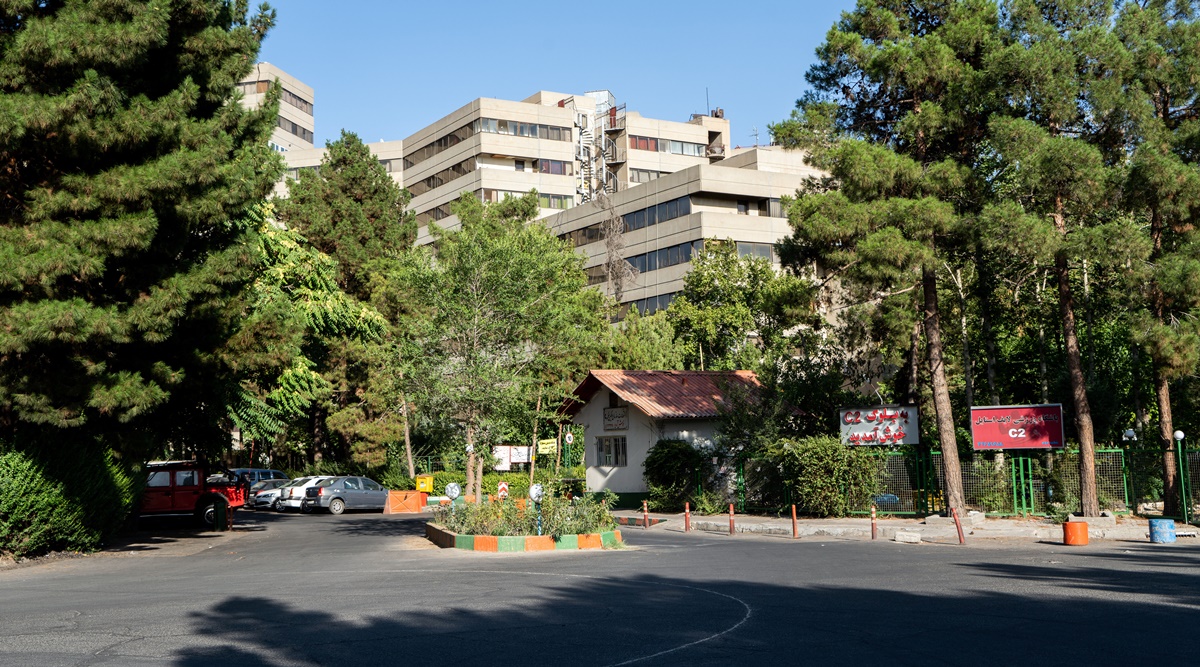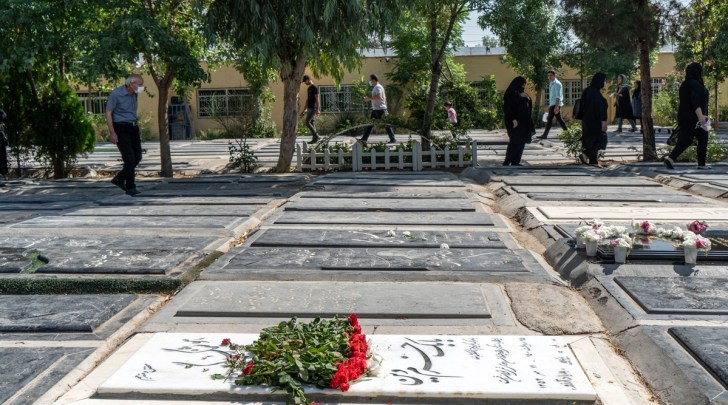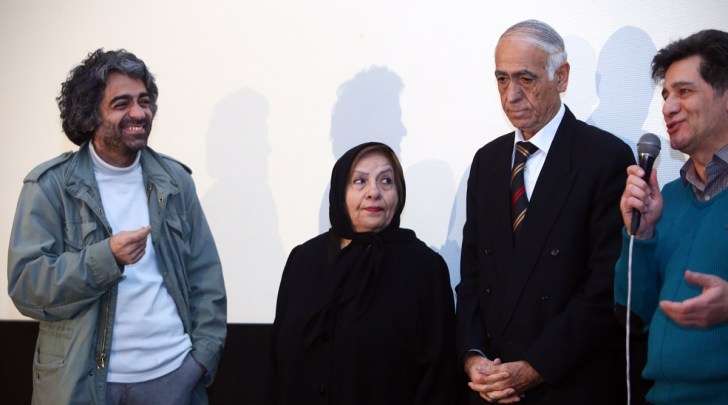 The Shahrak Ekbatan apartment buildings, where Akbar Khorramdin and Iran Mousavi lived with their son, Babak Khorramdin, in Tehran on July 2, 2021. (The New York Times)
The Shahrak Ekbatan apartment buildings, where Akbar Khorramdin and Iran Mousavi lived with their son, Babak Khorramdin, in Tehran on July 2, 2021. (The New York Times) Written by Farnaz Fassihi
The older couple first came to the public eye on a winter night in Tehran, Iran, when their film director son invited them to the stage after a screening. They were frail, and seemingly shy, and the younger man helped his mother up the stairs, then draped his arm around his father’s shoulder.
That was five years ago.
Now their son is dead, and Akbar Khorramdin, 81, and his wife, Iran Mousavi, 74, are back on the public stage, accused of his killing and, in a twist that has shocked and riveted Iranians, the killings of a daughter and a son-in-law over the course of a decade. The victims were drugged, suffocated, stabbed and then dismembered, authorities said.
The couple has confessed to the crimes, but if Khorramdin, a retired army colonel, and Mousavi, a homemaker, are remorseful, they have done a good job hiding it.
“I have no guilty conscience for any of the murders,” Khorramdin said in a television interview from detention. “I killed people who were very morally corrupt.”
Mousavi appeared no more contrite.
“We decided together, the two of us,” she said in a television interview shortly after she was arrested. “My husband suggested it and I agreed. I have a great relationship with my husband. He doesn’t beat me or curse at me.”
 The grave of Babak Khorramdin (The New York Times)
The grave of Babak Khorramdin (The New York Times)
Judge Mohammad Shahriari, who presides over criminal prosecutions in Tehran, said investigators believe the motive for the killings was family disputes. The couple are undergoing psychiatric evaluations, officials told Iranian media.
To say the case has rattled the psyche of Iranians since the remains of the couple’s son, Babak, 47, were found in a garbage bin in May, would be an understatement.
Already, Iranians had been battered by a raging pandemic, a shortage of vaccines, an economy buffeted by sanctions and the prospect of more social repression as hard-line conservatives take over the government. But the accusations against the elderly couple touched a nerve.
For Iranians, home is synonymous with sanctuary, and elderly parents, especially mothers, are revered as saintlike figures. And so they have reacted with bafflement and then outrage to every twist and turn of the case, and to the parents’ behavior after their arrests.
Photographs in Iranian media have shown Khorramdin clad in prison pajamas flashing a victory sign. He told authorities that he would do it all over again — and might even kill his other two adult children, too, if he were released, according to news reports.
 A handout photo shows Babak Khorramdin, left, with his parents Akbar Khorramdin and Iran Mousavi on stage after the screening of his film in Tehran in 2016. (Yasaman Zohoortalab via The New York Times)
A handout photo shows Babak Khorramdin, left, with his parents Akbar Khorramdin and Iran Mousavi on stage after the screening of his film in Tehran in 2016. (Yasaman Zohoortalab via The New York Times)
The couple were arrested after sanitation workers collecting trash discovered a bag containing body parts on May 15. The discovery was made at a vast, well-known apartment complex called Shahrak Ekbatan, where Babak Khorramdin, a relatively unknown film director, lived with his parents. Forensic experts got fingerprints from a piece of a hand, and identified him as the victim, authorities said.
When investigators reviewed surveillance camera footage from the building’s elevator the night before the body parts were discovered, they saw the couple transporting large plastic trash bags and a carry-on suitcase, authorities said. The mother held the elevator door open as the father made a few trips with the bags and adjusted them for space. At one point, video published in Iranian media shows, he glances at a mirror and fixes his cap.
When the police showed up at their apartment to interrogate the parents, they confessed to the killing — but it soon became apparent there was more to the case, authorities said. Over the next few days, investigators discovered missing-person reports filed for the couple’s daughter Arezou, who disappeared in 2018, and her husband, Faramarz, who went missing in 2011.
The couple then admitted having killed them, too, authorities said.
Much like serial killers, they adopted a pattern over years, they told interrogators, who gave this account: First the couple mixed sleeping pills into food to sedate their victims. Then they bound, suffocated and stabbed them. Finally, they dismembered the corpses in the bathtub and disposed of the remains in trash bins scattered around town.
In televised interviews, the parents said they had killed their children because they disapproved of their lifestyles. They accused their son of being physically aggressive, and said he was freeloading off them and having sex with girlfriends. Their daughter, they claimed, was addicted to drugs and drank alcohol, while her husband was abusive and dealt drugs.
Friends of Babak and Arezou say those descriptions are impossible to reconcile with the people they knew.
“For those of us who knew Babak, this is all unbelievable and very strange,” said Nima Abbaspour, a 46-year-old film director in Tehran who helped him make his first movie. “They looked like a regular family. He was respectable and mild mannered, a very calm guy.”
“Arezou was a very quiet girl. She never harmed anyone and growing up she was very obedient and didn’t even have boyfriends,” said Jaleh, 47, a classmate and neighbor who gave only her first name because she said she remained afraid of the family. Jaleh said after Arezou disappeared abruptly, friends would ask about her whenever they ran into her mother. She told them her daughter had migrated to Turkey.
Still, last week, Mousavi contradicted her earlier account of her relationship with her husband in an audiotape from prison released by Human Rights Activists News Agency, a Washington-based advocacy group. She said her husband was abusive toward her and she accused him of raping Arezou.
At the tight-knit Shahrak Ekbatan housing complex, where the couple have lived for 40 years, residents recall them babysitting for neighbors, chatting with shopkeepers and taking evening strolls in the gardens.
“We cannot comprehend that there were murderers living among us,” said one resident, Minoo, a 51-year-old mother of two, who also did not want to give her last name because she said she was afraid of the family. “We may have passed them by every day and said hello. This apartment next to us was a house of horror and none of us knew.”
This article originally appeared in The New York Times.
- The Indian Express website has been rated GREEN for its credibility and trustworthiness by Newsguard, a global service that rates news sources for their journalistic standards.

